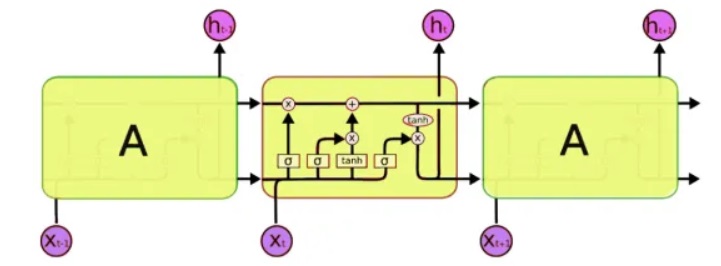import os
# Force CPU
os.environ["CUDA_VISIBLE_DEVICES"] = "-1"
os.environ['TF_CPP_MIN_LOG_LEVEL'] = '3' # 0 = all messages are logged, 3 - INFO, WARNING, and ERROR messages are not printed
from keras.callbacks import LambdaCallback
from keras.models import Sequential
from keras.layers import Dense, Dropout, Embedding, LSTM, TimeDistributed
from keras.optimizers import RMSprop
from keras.utils.data_utils import get_file
import keras
from collections import Counter
import pickle
import numpy as np
import random
import sys
import time
import io
import re
import argparse
# Transforms text to vectors of integer numbers representing in text tokens and back. Handles word and character level tokenization.
class Vectorizer:
def __init__(self, text, word_tokens, pristine_input, pristine_output):
self.word_tokens = word_tokens
self._pristine_input = pristine_input
self._pristine_output = pristine_output
tokens = self._tokenize(text)
# print('corpus length:', len(tokens))
token_counts = Counter(tokens)
# Sort so most common tokens come first in our vocabulary
tokens = [x[0] for x in token_counts.most_common()]
self._token_indices = {x: i for i, x in enumerate(tokens)}
self._indices_token = {i: x for i, x in enumerate(tokens)}
self.vocab_size = len(tokens)
print('Vocab size:', self.vocab_size)
def _tokenize(self, text):
if not self._pristine_input:
text = text.lower()
if self.word_tokens:
if self._pristine_input:
return text.split()
return Vectorizer.word_tokenize(text)
return text
def _detokenize(self, tokens):
if self.word_tokens:
if self._pristine_output:
return ' '.join(tokens)
return Vectorizer.word_detokenize(tokens)
return ''.join(tokens)
def vectorize(self, text):
"""Transforms text to a vector of integers"""
tokens = self._tokenize(text)
indices = []
for token in tokens:
if token in self._token_indices:
indices.append(self._token_indices[token])
else:
print('Ignoring unrecognized token:', token)
return np.array(indices, dtype=np.int32)
def unvectorize(self, vector):
"""Transforms a vector of integers back to text"""
tokens = [self._indices_token[index] for index in vector]
return self._detokenize(tokens)
@staticmethod
def word_detokenize(tokens):
# A heuristic attempt to undo the Penn Treebank tokenization above. Pass the
# --pristine-output flag if no attempt at detokenizing is desired.
regexes = [
# Newlines
(re.compile(r'[ ]?\\n[ ]?'), r'\n'),
# Contractions
(re.compile(r"\b(can)\s(not)\b"), r'\1\2'),
(re.compile(r"\b(d)\s('ye)\b"), r'\1\2'),
(re.compile(r"\b(gim)\s(me)\b"), r'\1\2'),
(re.compile(r"\b(gon)\s(na)\b"), r'\1\2'),
(re.compile(r"\b(got)\s(ta)\b"), r'\1\2'),
(re.compile(r"\b(lem)\s(me)\b"), r'\1\2'),
(re.compile(r"\b(mor)\s('n)\b"), r'\1\2'),
(re.compile(r"\b(wan)\s(na)\b"), r'\1\2'),
# Ending quotes
(re.compile(r"([^' ]) ('ll|'re|'ve|n't)\b"), r"\1\2"),
(re.compile(r"([^' ]) ('s|'m|'d)\b"), r"\1\2"),
(re.compile(r'[ ]?”'), r'"'),
# Double dashes
(re.compile(r'[ ]?--[ ]?'), r'--'),
# Parens and brackets
(re.compile(r'([\[\(\{\<]) '), r'\1'),
(re.compile(r' ([\]\)\}\>])'), r'\1'),
(re.compile(r'([\]\)\}\>]) ([:;,.])'), r'\1\2'),
# Punctuation
(re.compile(r"([^']) ' "), r"\1' "),
(re.compile(r' ([?!\.])'), r'\1'),
(re.compile(r'([^\.])\s(\.)([\]\)}>"\']*)\s*$'), r'\1\2\3'),
(re.compile(r'([#$]) '), r'\1'),
(re.compile(r' ([;%:,])'), r'\1'),
# Starting quotes
(re.compile(r'(“)[ ]?'), r'"')
]
text = ' '.join(tokens)
for regexp, substitution in regexes:
text = regexp.sub(substitution, text)
return text.strip()
@staticmethod
def word_tokenize(text):
# Basic word tokenizer based on the Penn Treebank tokenization script, but
# setup to handle multiple sentences. Newline aware, i.e. newlines are
# replaced with a specific token. You may want to consider using a more robust
# tokenizer as a preprocessing step, and using the --pristine-input flag.
regexes = [
# Starting quotes
(re.compile(r'(\s)"'), r'\1 “ '),
(re.compile(r'([ (\[{<])"'), r'\1 “ '),
# Punctuation
(re.compile(r'([:,])([^\d])'), r' \1 \2'),
(re.compile(r'([:,])$'), r' \1 '),
(re.compile(r'\.\.\.'), r' ... '),
(re.compile(r'([;@#$%&])'), r' \1 '),
(re.compile(r'([?!\.])'), r' \1 '),
(re.compile(r"([^'])' "), r"\1 ' "),
# Parens and brackets
(re.compile(r'([\]\[\(\)\{\}\<\>])'), r' \1 '),
# Double dashes
(re.compile(r'--'), r' -- '),
# Ending quotes
(re.compile(r'"'), r' ” '),
(re.compile(r"([^' ])('s|'m|'d) "), r"\1 \2 "),
(re.compile(r"([^' ])('ll|'re|'ve|n't) "), r"\1 \2 "),
# Contractions
(re.compile(r"\b(can)(not)\b"), r' \1 \2 '),
(re.compile(r"\b(d)('ye)\b"), r' \1 \2 '),
(re.compile(r"\b(gim)(me)\b"), r' \1 \2 '),
(re.compile(r"\b(gon)(na)\b"), r' \1 \2 '),
(re.compile(r"\b(got)(ta)\b"), r' \1 \2 '),
(re.compile(r"\b(lem)(me)\b"), r' \1 \2 '),
(re.compile(r"\b(mor)('n)\b"), r' \1 \2 '),
(re.compile(r"\b(wan)(na)\b"), r' \1 \2 '),
# Newlines
(re.compile(r'\n'), r' \\n ')
]
text = " " + text + " "
for regexp, substitution in regexes:
text = regexp.sub(substitution, text)
return text.split()
def _create_sequences(vector, seq_length, seq_step):
# Take strips of our vector at seq_step intervals up to our seq_length
# and cut those strips into seq_length sequences
passes = []
for offset in range(0, seq_length, seq_step):
pass_samples = vector[offset:]
num_pass_samples = pass_samples.size // seq_length
pass_samples = np.resize(pass_samples,
(num_pass_samples, seq_length))
passes.append(pass_samples)
# Stack our sequences together. This will technically leave a few "breaks"
# in our sequence chain where we've looped over are entire dataset and
# return to the start, but with large datasets this should be neglegable
return np.concatenate(passes)
def shape_for_stateful_rnn(data, batch_size, seq_length, seq_step):
"""
Reformat our data vector into input and target sequences to feed into our RNN. Tricky with stateful RNNs.
"""
# Our target sequences are simply one timestep ahead of our input sequences.
# e.g. with an input vector "wherefore"...
# targets: h e r e f o r e
# predicts ^ ^ ^ ^ ^ ^ ^ ^
# inputs: w h e r e f o r
inputs = data[:-1]
targets = data[1:]
# We split our long vectors into semi-redundant seq_length sequences
inputs = _create_sequences(inputs, seq_length, seq_step)
targets = _create_sequences(targets, seq_length, seq_step)
# Make sure our sequences line up across batches for stateful RNNs
inputs = _batch_sort_for_stateful_rnn(inputs, batch_size)
targets = _batch_sort_for_stateful_rnn(targets, batch_size)
# Our target data needs an extra axis to work with the sparse categorical
# crossentropy loss function
targets = targets[:, :, np.newaxis]
return inputs, targets
def _batch_sort_for_stateful_rnn(sequences, batch_size):
# Now the tricky part, we need to reformat our data so the first
# sequence in the nth batch picks up exactly where the first sequence
# in the (n - 1)th batch left off, as the RNN cell state will not be
# reset between batches in the stateful model.
num_batches = sequences.shape[0] // batch_size
num_samples = num_batches * batch_size
reshuffled = np.zeros((num_samples, sequences.shape[1]), dtype=np.int32)
for batch_index in range(batch_size):
# Take a slice of num_batches consecutive samples
slice_start = batch_index * num_batches
slice_end = slice_start + num_batches
index_slice = sequences[slice_start:slice_end, :]
# Spread it across each of our batches in the same index position
reshuffled[batch_index::batch_size, :] = index_slice
return reshuffled
def load_data(data_file, word_tokens, pristine_input, pristine_output, batch_size, seq_length=50, seq_step=25):
global vectorizer
try:
with open(data_file, encoding='utf-8') as input_file:
text = input_file.read()
except FileNotFoundError:
print("No input.txt in data_dir")
sys.exit(1)
skip_validate = True
# try:
# with open(os.path.join(data_dir, 'validate.txt'), encoding='utf-8') as validate_file:
# text_val = validate_file.read()
# skip_validate = False
# except FileNotFoundError:
# pass # Validation text optional
# Find some good default seed string in our source text.
# self.seeds = find_random_seeds(text)
# Include our validation texts with our vectorizer
all_text = text if skip_validate else '\n'.join([text, text_val])
vectorizer = Vectorizer(all_text, word_tokens, pristine_input, pristine_output)
data = vectorizer.vectorize(text)
x, y = shape_for_stateful_rnn(data, batch_size, seq_length, seq_step)
print("Word_tokens:", word_tokens)
print('x.shape:', x.shape)
print('y.shape:', y.shape)
if skip_validate:
return x, y, None, None, vectorizer
data_val = vectorizer.vectorize(text_val)
x_val, y_val = shape_for_stateful_rnn(data_val, batch_size,
seq_length, seq_step)
print('x_val.shape:', x_val.shape)
print('y_val.shape:', y_val.shape)
return x, y, x_val, y_val, vectorizer
def make_model(batch_size, vocab_size, embedding_size=64, rnn_size=128, num_layers=2):
# Conversely if your data is large (more than about 2MB), feel confident to increase rnn_size and train a bigger model (see details of training below).
# It will work significantly better. For example with 6MB you can easily go up to rnn_size 300 or even more.
model = Sequential()
model.add(Embedding(vocab_size, embedding_size, batch_input_shape=(batch_size, None)))
for layer in range(num_layers):
model.add(LSTM(rnn_size, stateful=True, return_sequences=True))
model.add(Dropout(0.2))
model.add(TimeDistributed(Dense(vocab_size, activation='softmax')))
model.compile(loss='sparse_categorical_crossentropy', optimizer='rmsprop', metrics=['accuracy'])
return model
def train(model, x, y, x_val, y_val, batch_size, num_epochs):
print('Training...')
# print("Shape:", x.shape, y.shape)
# print(num_epochs, batch_size, x[0], y[0])
train_start = time.time()
validation_data = (x_val, y_val) if (x_val is not None) else None
callbacks = None
model.fit(x, y, validation_data=validation_data,
batch_size=batch_size,
shuffle=False,
epochs=num_epochs,
verbose=1,
callbacks=callbacks)
# self.update_sample_model_weights()
train_end = time.time()
print('Training time', train_end - train_start)
def sample_preds(preds, temperature=1.0):
"""
Samples an unnormalized array of probabilities. Use temperature to
flatten/amplify the probabilities.
"""
preds = np.asarray(preds).astype(np.float64)
# Add a tiny positive number to avoid invalid log(0)
preds += np.finfo(np.float64).tiny
preds = np.log(preds) / temperature
exp_preds = np.exp(preds)
preds = exp_preds / np.sum(exp_preds)
probas = np.random.multinomial(1, preds, 1)
return np.argmax(probas)
def generate(model, vectorizer, seed, length=100, diversity=0.5):
seed_vector = vectorizer.vectorize(seed)
# Feed in seed string
print("Seed:", seed, end=' ' if vectorizer.word_tokens else '')
model.reset_states()
preds = None
for char_index in np.nditer(seed_vector):
preds = model.predict(np.array([[char_index]]), verbose=0)
sampled_indices = [] # np.array([], dtype=np.int32)
# Sample the model one token at a time
for i in range(length):
char_index = 0
if preds is not None:
char_index = sample_preds(preds[0][0], diversity)
sampled_indices.append(char_index) # = np.append(sampled_indices, char_index)
preds = model.predict(np.array([[char_index]]), verbose=0)
sample = vectorizer.unvectorize(sampled_indices)
return sample
if __name__ == "__main__":
batch_size = 32 # Batch size for each train
num_epochs = 10 # Number of epochs of training
out_len = 200 # Length of the output phrase
seq_length = 50 # 50 # Determines, how long phrases will be used for training
use_words = False # Use words instead of characters (slower speed, bigger vocabulary)
data_file = "text_habr.txt" # Source text file
seed = "A" # Initial symbol of the text
parser = argparse.ArgumentParser()
parser.add_argument("-t", "--text", action="store", required=False, dest="text", help="Input text file")
parser.add_argument("-e", "--epochs", action="store", required=False, dest="epochs", help="Number of training epochs")
parser.add_argument("-p", "--phrase_len", action="store", required=False, dest="phrase_len", help="Phrase analyse length")
parser.add_argument("-o", "--out_len", action="store", required=False, dest="out_len", help="Output text length")
parser.add_argument("-g", "--generate", action="store_true", required=False, dest='generate', help="Generate output only without training")
args = parser.parse_args()
if args.text is not None:
data_file = args.text
if args.epochs is not None:
num_epochs = int(args.epochs)
if args.phrase_len is not None:
seq_length = int(args.phrase_len)
if args.out_len is not None:
out_len = int(args.out_len)
# Load text data
pristine_input, pristine_output = False, False
x, y, x_val, y_val, vectorizer = load_data(data_file, use_words, pristine_input, pristine_output, batch_size, seq_length)
model_file = data_file.lower().replace('.txt', '.h5')
if args.generate is False:
# Make model
model = make_model(batch_size, vectorizer.vocab_size)
# Train model
train(model, x, y, x_val, y_val, batch_size, num_epochs)
# Save model to file
model.save(filepath=model_file)
model = keras.models.load_model(model_file)
predict_model = make_model(1, vectorizer.vocab_size)
predict_model.set_weights(model.get_weights())
# Generate phrases
res = generate(predict_model, vectorizer, seed=seed, length=out_len)
print(res)

